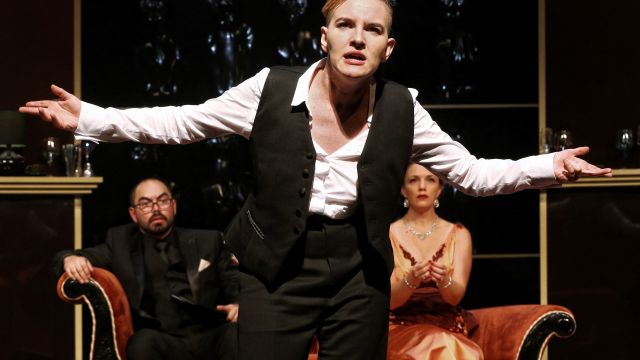Dr. Theatre Rescues Actress
Imagine being a prolific actress and a playwright at the same time as managing chronic back pain. That’s the life of Kate Mulvany, who has been cast as the lead in Bell Shakespeare’s Richard III. It was her unique connection to England’s much maligned King that in part inspired her to take on the role. David Spicer reports.
When the skeletal remains of Richard III were exhumed in 2012, more than 500 years after he was killed in battle, Kate Mulvany felt awful for him.
“Not because he was killed in a battle and ended up (buried) in a carpark. I felt awful because I empathised with how much pain he must have spent his life in, because I have the same spine,” she said.
The remains of Richard III showed he suffered from a curvature of the spine.
“It was very confronting to see it but I kind of had his back, in a metaphorical and literal way. Part of me was relieved that the way he was represented - in terms of physicality – was true. It kind of upped him in my eyes. He must have been an extraordinary man to get through life with that disability.
“At the time if someone had a terrible deformity they were seen as a victim of witchcraft or an evil figure. He would have also had to deal with that.
“I feel sorry for him. He does not deserve the terrible names he was called. He doesn’t deserve to be known as the most evil king in history. You can see from the procession at his funeral (in 2015) when his bones were re-buried, that a lot of other people don’t believe that either.”
Kate knows first hand the challenges Richard III faced. Radiation treatment for childhood cancer left her with a spinal malformation. Only half her back muscle remained and the right side of her vertebrae did not grow beyond three years of age.
To play Richard she “imagines (what it would be like) if I had not had operations and therapy all my life to help keep me straight.”

Kate doesn’t have to imagine what it’s like to live with pain. Playing the role exacerbates her discomfort as she slips back into the ‘bad habits’.
“That is how Richard got through life. When I am performing as Richard I break all of my own rules.”
Yet remarkably there is no discomfort for herduring the performance.
“When I walk off stage it is as bad as ever, but on stage it is a beautiful gift not to focus on pain. Stepping on stage is better than any painkiller or therapy. They call it ‘Dr Theatre’, and the pain dissipates. I have been in contact with medical professionals looking at the psychology of teaching patients to take on another persona to ease chronic pain.”
The differences between Richard III and Kate are more obvious.
“Even though I am playing a man, I am obviously a woman physically. What is going to be interesting is seeing the different reaction to some of (Shakespeare’s dialogue).”
“I don’t do it differently to a man. It is not about gender, it is about agenda. I think that Richard is a misogynist, but women can be misogynists too. Some lines normally get a chuckle from the audience, but how will they feel hearing that misogyny coming out of a woman’s mouth?”
Kate gives an example of Richard’s line, ‘Whatever woman here be wooed, I’ll have her but I won’t keep her long.’
“It is a throwaway line the audience might (normally) chuckle at and think, ‘oh what a cheeky man’. When it comes from a woman it just has a different taste to it.”
Kate says she is “loving the fact” that more women are getting the opportunity to play male leads.
In recent times Robyn Nevin was cast as Queen Lear with the Melbourne Theatre Company and Pamela Rabe was also cast as Richard III in the Sydney Theatre Company’s War of the Roses.
“It happens all the time in my plays. I don’t mind cross casting.”

In the recent revival of Kate’s Jasper Jones, a woman payed Warwick, the bully, who delivered the lines and deliveries in a game of cricket.
“For me the most important thing is that whoever is playing the role has a damn good time doing it. I don’t believe an audience needs to see a man as a man, or a woman as a woman. They have enough intellect to enjoy a theatrical risk.”
Whilst Kate is on stage with the Bell Shakespeare Company for its Sydney season, across town another of her plays, The Rasputin Affair, will have its World Premiere at the Ensemble Theatre.
The Rasputin Affair is set in St Petersburg in 1917, where a group of like-minded individuals gather with a plate of pink poisoned cupcakes and a shared aim: to rid the world of the mad monk.
“I have always been fascinated by Rasputin. He is like Richard - a revolting charmer, a man who very sneakily uses his charm and oddity to make his way to the top of the Russian royal family, and was part of (the reason for) their annihilation.”
I asked Kate if she considers Rasputin and Richard brilliant or evil?
“Both, but I am more inclined to think that Rasputin was evil.”
At the other end of the spectrum is the musical Kate co-wrote,Masquerade, based on the book by Kit Williams. It premiered in 2015 and will be performed this year for the first time by schools and amateur theatres.
“The overriding theme of Masquerade is love. Sometimes when I say it in professional rounds, people roll their eyes.
“What a joy to rehearse a play that is all about love and the universe.”
Kate read Masquerade when she was in hospital as a child. She was later thrilled to meet Kit Williams, the iconic author of the picture book. Clues in the publication about the location of a jewelled golden hare led to a search across Britain.
 She still keeps in touch with Kit, even though it is not always easy as he spends much of the year hidden away “inventing things” with his wife.
She still keeps in touch with Kit, even though it is not always easy as he spends much of the year hidden away “inventing things” with his wife.
“Every now and then he writes something for his own enjoyment. The latest book had only 200 copies released, which he gives to people who might like it. He paints and invents the most extraordinary bits of art.
“Once a year he’ll have an open house to sell his wares, then the rest of the time he leads a reclusive life. If I could live like that I would.”
But at the moment Kate’s life is at the opposite end of the spectrum, as she moves from one acting or writing gig to another.
“I am never going to complain about being busy. But every actor or artist who doesn’t have a commission or contract are still working their asses off. That is what we have to do.”
Kate says she is learning to “say no sometimes”, but she couldn’t say no to Richard III.
Article originally published in the March / April 2017 edition of Stage Whispers.
Images (from top): Kate as Richard 3 (photographer Prudence Upton); Kate in The Literati (photographer Daniel Boud); The Rasputin Affair at The Ensemble (photographer Prudence Upton) and Jasper Jones (photographer Lisa Tomasetti).
Subscribe to our E-Newsletter, buy our latest print edition or find a Performing Arts book at Book Nook.

